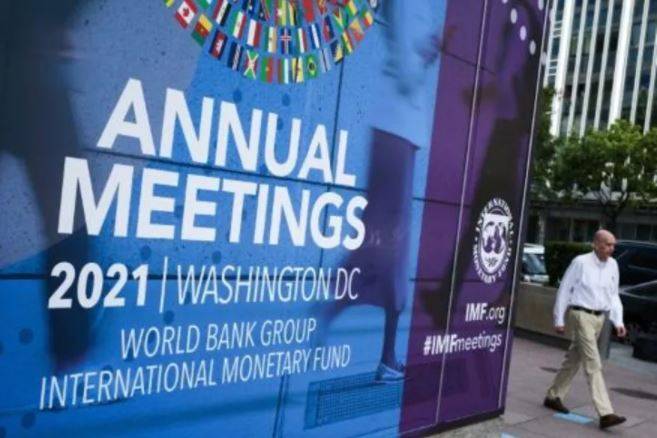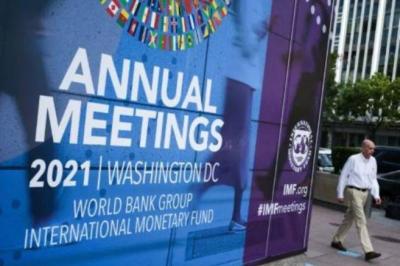Financial officials from around the world gathered in Washington on Wednesday to find ways to alleviate supply chain bottlenecks leading to rising prices and threatening to disrupt economic recovery. Suppliers have struggled to keep up with increased demand, as ships queue outside U.S. ports waiting to unload goods. U.S. consumer inflation remained high in September, and global oil prices surged more than eighty percent per barrel, reaching their highest level in years, while British families may have to forgo turkey at Christmas dinner.
Global supply challenges are a central focus at the IMF and G20 meetings for advanced economies, as well as for the smaller gathering of G7 finance ministers. Restrictions imposed to curb the spread of COVID-19 led to the closure of manufacturing and trade routes, while suppliers facing labor and truck driver shortages could not keep pace with the sudden rise in demand for goods as economies began to reopen after the pandemic.
These disruptions, which some politicians fear may be long-lasting, have hindered the momentum of recovery, prompting the IMF to revise down its growth estimates for major economies like the U.S. and Germany. G7 officials agreed to work together to monitor the difficulties. British Treasury Secretary Rishi Sunak, who chaired the meeting of the world’s richest nations, stated, "Supply chain issues are felt worldwide, and financial leaders must collaborate to tackle our shared challenges." The World Bank estimates that 8.5 percent of shipping containers are either stuck in ports or around them, double the rate in January.
Inflation Risk
Italian central bank Governor Ignazio Visco and the IMF, among others, agreed that inflation pressures have largely stemmed from short-term factors such as rising demand and supply issues. However, Visco acknowledged that it "could take months for these pressures to ease." He told reporters that G20 central bank governors are assessing whether there are "structural factors" driving inflation higher than expected and "if there are any elements... that could become permanent."
Central bank governors seek to support recovery with easy financial conditions while avoiding a sustained rise in inflation. The G20 stated that central banks "will act as necessary" to maintain price stability "while considering inflation pressures that are temporary." However, World Bank President David Malpass warned that rises in some prices "will not be temporary." He added, "It will take time and cooperation from policymakers around the world to sort them out."
IMF Managing Director Kristalina Georgieva noted that the slow pace of vaccination in developing countries to contain the pandemic contributes to supply constraints, and "as long as it expands, the risk of disruptions in global supply chains will be higher."
Never Again
In the world’s largest economy, U.S. President Joe Biden announced on Wednesday an initiative to alleviate backlogs by pushing for around-the-clock operations at ports and suppliers. He secured a commitment for extended hours from both operating groups at the massive Port of Los Angeles, as well as companies like Walmart, FedEx, and UPS.
However, Biden emphasized that policies must be put in place to reduce reliance on single sources and bolster domestic production to avoid such supply shocks in the future. He stated, "Our country or economy must not be unable to produce essential products we need because we cannot access the materials." He stressed, "We must not have to rely heavily on one company or one country again." This sentiment was echoed by French Finance Minister Bruno Le Maire, who told reporters on the sidelines of the meetings that "the answer lies in one word: independence."




